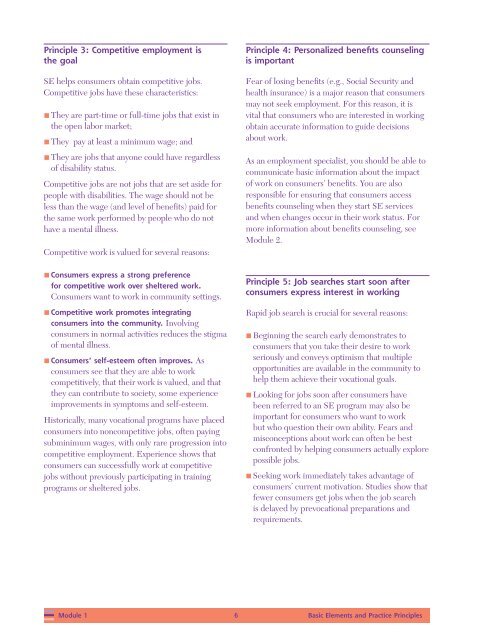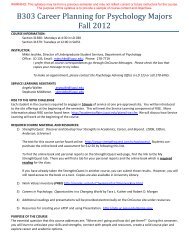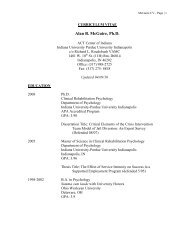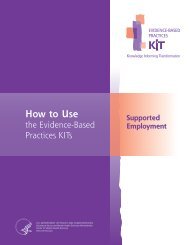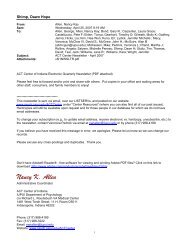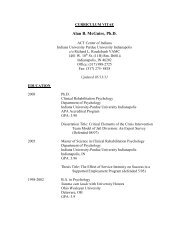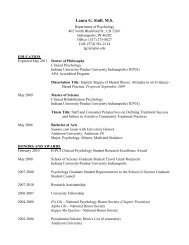Supported Employment: Training Frontline Staff - SAMHSA Store ...
Supported Employment: Training Frontline Staff - SAMHSA Store ...
Supported Employment: Training Frontline Staff - SAMHSA Store ...
You also want an ePaper? Increase the reach of your titles
YUMPU automatically turns print PDFs into web optimized ePapers that Google loves.
Principle 3: Competitive employment is<br />
the goal<br />
SE helps consumers obtain competitive jobs.<br />
Competitive jobs have these characteristics:<br />
• They are part-time or full-time jobs that exist in<br />
the open labor market;<br />
• They pay at least a minimum wage; and<br />
• They are jobs that anyone could have regardless<br />
of disability status.<br />
Competitive jobs are not jobs that are set aside for<br />
people with disabilities. The wage should not be<br />
less than the wage (and level of benefits) paid for<br />
the same work performed by people who do not<br />
have a mental illness.<br />
Competitive work is valued for several reasons:<br />
• Consumers express a strong preference<br />
for competitive work over sheltered work.<br />
Consumers want to work in community settings.<br />
• Competitive work promotes integrating<br />
consumers into the community. Involving<br />
consumers in normal activities reduces the stigma<br />
of mental illness.<br />
• Consumers’ self-esteem often improves. As<br />
consumers see that they are able to work<br />
competitively, that their work is valued, and that<br />
they can contribute to society, some experience<br />
improvements in symptoms and self-esteem.<br />
Historically, many vocational programs have placed<br />
consumers into noncompetitive jobs, often paying<br />
subminimum wages, with only rare progression into<br />
competitive employment. Experience shows that<br />
consumers can successfully work at competitive<br />
jobs without previously participating in training<br />
programs or sheltered jobs.<br />
Principle 4: Personalized benefits counseling<br />
is important<br />
Fear of losing benefits (e.g., Social Security and<br />
health insurance) is a major reason that consumers<br />
may not seek employment. For this reason, it is<br />
vital that consumers who are interested in working<br />
obtain accurate information to guide decisions<br />
about work.<br />
As an employment specialist, you should be able to<br />
communicate basic information about the impact<br />
of work on consumers’ benefits. You are also<br />
responsible for ensuring that consumers access<br />
benefits counseling when they start SE services<br />
and when changes occur in their work status. For<br />
more information about benefits counseling, see<br />
Module 2.<br />
Principle 5: Job searches start soon after<br />
consumers express interest in working<br />
Rapid job search is crucial for several reasons:<br />
• Beginning the search early demonstrates to<br />
consumers that you take their desire to work<br />
seriously and conveys optimism that multiple<br />
opportunities are available in the community to<br />
help them achieve their vocational goals.<br />
• Looking for jobs soon after consumers have<br />
been referred to an SE program may also be<br />
important for consumers who want to work<br />
but who question their own ability. Fears and<br />
misconceptions about work can often be best<br />
confronted by helping consumers actually explore<br />
possible jobs.<br />
• Seeking work immediately takes advantage of<br />
consumers’ current motivation. Studies show that<br />
fewer consumers get jobs when the job search<br />
is delayed by prevocational preparations and<br />
requirements.<br />
Module 1 6 Basic Elements and Practice Principles


